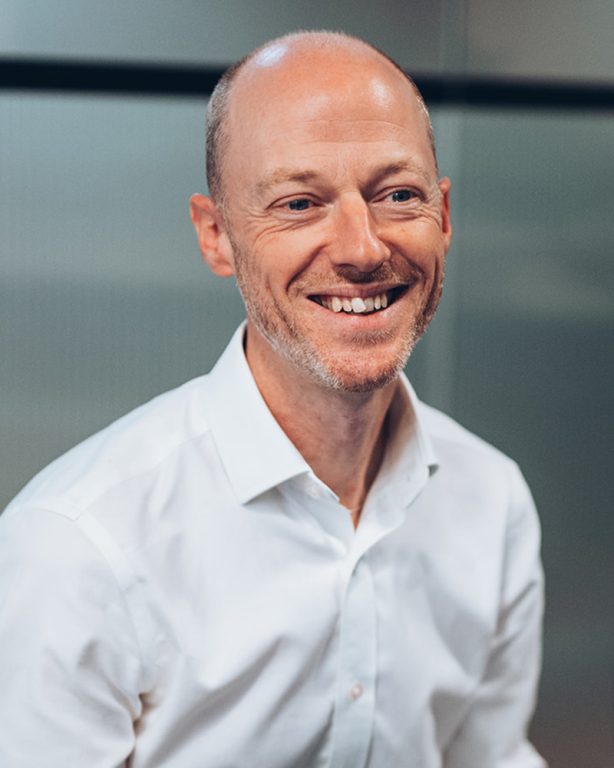
Greg Mileham
COO
Greg oversees the day-to-day operations of exceptional™, and develops ways to help it grow.

exceptional™ Managing Director Greg Mileham asks whether purpose-driven digital marketing can really drive positive change, and what he learned at the Blue Earth Summit.
I’m going to try and answer a very difficult question:
Does the purpose-driven marketing we do at exceptional™ help companies have a positive impact on the world, or does it only inflate their apparent impact?
Or, to look at the bigger picture:
Can marketing actually have a positive impact, or does its place in our economy merely demand that it help the highest bidder bulk up its ESG credentials?
I wouldn’t be here at exceptional™ if I didn’t believe that marketing could, in fact, make a difference in the world. Those questions, however, are extremely valid. If I were to brush them aside with a pithy prepared line, I’d be doing exactly the kind of damaging, surface-level lip service we want to avoid.
To create a better world, we have to work with purpose-led companies, those with a mission that puts purpose first, rather than working with companies which prioritise profit and see any positive impact they have as an added bonus. But what does a truly purpose-led company actually look like?
A couple of weeks ago I had the privilege of attending the Blue Earth Summit, a conference which brings together leaders from across the economy to discuss the challenges of climate change. One talk, by Tony’s Chocolonely CEO Douglas Lamont, perfectly demonstrated what a purpose-led company should look like.

Tony’s Chocolonely wasn’t founded by self-identified entrepreneurs, it was founded by journalists. They were originally brought together not by a desire to make money – or even make chocolate – but by a far more fundamental question:
How can we end the mass exploitation that takes place in the cocoa industry?
After much deliberation, they concluded that founding their own chocolate company, establishing a highly ethical supply chain, and then making that supply chain readily available for their competitors, was the best way to achieve that goal.
Everything they do comes back to that core question – how can we end the mass exploitation that takes place in the cocoa industry? It’s that question which led them to make their supply chain available to others, where a profit-driven team may have kept it – and all the positive impact marketing that comes with it – to themselves.
They didn’t start their business because they smelled an opportunity. They started it because they saw a problem.
I believe that this attitude exemplifies what a purpose-DRIVEN company should be. By working with truly purpose-driven companies like Tony’s, marketing can have a positive impact, helping them win more work and drive the change they want to see in the world.
I also believe that it’s immensely important for both purpose-driven companies – and the marketing agencies like exceptional™ that work with them – to earnestly address the most difficult questions we can. It is right to question our motives. It is right to hold us accountable and ensure that we don’t drift back to a purely profit-driven model, especially during harder times. In fact, when you’re truly purpose-driven, accountability can be an opportunity.

Looking back to the Blue Earth Summit, there was another moment that stuck out. I was watching a panel which included Nigel Pocklington, the CEO of Good Energy, and two of his peers/competitors in the industry.
At one point, three questions were asked by the audience. One of these questions was far more difficult than the others.
One audience member pointed out that as developed countries push for more sustainable energy, the materials necessary to create that renewable energy infrastructure still rely upon the exploitation of the Global South. How does Good Energy address that?
It’s a bit of a gotcha – but that doesn’t mean it’s not a very fair question to ask.
The panellists were given the option of choosing which of the three questions they wanted to answer. Nigel, who went second, chose the hardest question. His response was earnest, it wasn’t dismissive, and it didn’t avoid discussing the challenges that come with creating a greener energy system.
To be a great leader, you can’t shy away from the toughest questions – even when you don’t have all the answers. If accountability makes you nervous, you may not be as purpose-driven as you thought.
If you’re a truly purpose-driven enterprise, tackling those tough questions shouldn’t feel like a challenge. It should feel like an opportunity to ensure that you’re doing everything you can to take on the problem you want to solve.
Does the purpose-driven marketing we do at exceptional™ help companies have a positive impact on the world, or does it only inflate their apparent impact?
By working with companies that are truly driven by their purpose and don’t shy away from tough questions, I have no doubt that we really can help them to have a positive impact. That attitude doesn’t just impact our client vetting process – it also deeply shapes the way we work with those clients.
Our job isn’t to equip our clients with prepared “lines” that they can use to talk about the good they’re doing and to deflect any criticism. It’s about equipping them with the tools to talk honestly about the good they’re doing in a way that helps them fulfil the purpose their business was set up to achieve.
Any questions?
Feel free to reach out to me at [email protected]

COO
Greg oversees the day-to-day operations of exceptional™, and develops ways to help it grow.
View my other articles and opinion pieces below
B Corp Month 2025 is upon us. It’s a great time to reflect on how far we’ve come, yes, but more importantly, it’s another reminder that B Corp certification isn’t the end – it’s just the beginning. The real work lies in continuously striving for improvement, staying curious, and challenging our own assumptions. In June […]

In June 2024, exceptional™ was awarded B Corp status, with a B Impact Assessment score of 89. Fantastic! But at the end of the day, that certification is an acknowledgement – a piece of paper, a plaque, a new entry in the B Corp directory. It doesn’t make us a different agency to the one […]

exceptional™ has achieved B Corp™ Certification! It shows that we have met high standards of verified performance, accountability, and transparency on factors ranging from sustainability and employee benefits to charitable giving and supply chain practices. As a milestone, our certification underscores our commitment to leveraging our digital marketing expertise to have a positive impact on […]

Your business won’t do good just because your team is full of good people. However, if we’re going to take the next step and ingrain high environmental and transparency standards into companies across the UK, each company needs to be judged relative to its ability. For example, a 4000-person international corporation should be held to […]
